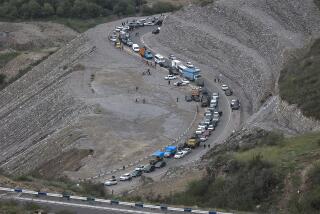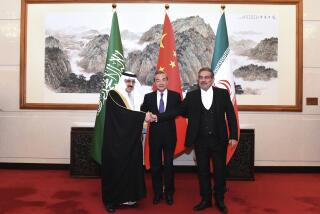Iran’s leaders call nuclear deal a success
TEHRAN — Iran’s leadership Sunday hailed the interim nuclear deal brokered in Geneva between Iranian envoys and representatives of the United States and five other world powers.
Iran’s supreme leader, Ayatollah Ali Khamenei, thanked President Hassan Rouhani and his negotiating team in a message that called the Geneva talks a “success,” a crucial sign of support from the nation’s ultimate arbiter of national security issues.
The Iranian president, meantime, gave a nationally televised address labeling the agreement a breakthrough that could eventually help eliminate the vise of international sanctions, which have put a stranglehold on Iran’s economy in recent years.
The accord, Rouhani said, “marks a starting point for a new experience for the Iranian nation,” and a global recognition of Iran’s right to nuclear power.
Rouhani, a soft-spoken cleric and longtime government insider, was elected in June on a pledge to work toward alleviating the crippling sanctions and heighten Tehran’s engagement with the world. The deal brokered in Geneva represents a major political victory for the new president, who faces opposition at home from hard-liners opposed to any perceived compromise with the West.
Iran’s president spoke at a news conference here flanked by widows and other relatives of Iranian nuclear scientists assassinated in recent years in a series of attacks that Tehran has blamed on Israel.
Pro-government commentators also lauded the agreement, hammered out during four days of intense negotiation in Geneva between Iran and six nations: the United States, Russia, China, Britain, France and Germany.
“Iranians see this as a major achievement,” Mohammad Morandi, an analyst at Tehran University, said in a telephone interview. “The United States and its allies have been forced to accept the realities on the ground.”
News of the accord seemed to provide at least a short-term boost to Iran’s economy, as the main stock market index jumped in value and Iran’s currency gained ground against the U.S. dollar in street sales.
The interim deal would put constraints on Iran’s nuclear program for six months in exchange for limited relief of international sanctions, totaling about $7 billion in relief, according to U.S. officials. Both sides called the accord a significant, albeit interim step that could set the stage for a permanent resolution of the decade-long dispute about Iran’s nuclear program.
The next phase of nuclear talks between Iran and world powers is expected to work toward a comprehensive agreement. The Iranian president said his nation had a “strong will” to proceed with the negotiations on the basis of “mutual respect.”
The accord reached between Iran and six world powers would appear to lessen the possibility, at least for now, of military hostilities arising from Iran’s disputed nuclear program.
The deal also marked another sign of the possible easing of more than three decades of mutual antagonism between the United States and the Islamic Republic, which was formed following the 1979 overthrow of the U.S.-backed monarchy in Tehran. A U.S.-Iranian rapprochement would have far-reaching consequences in a region where Washington’s major allies, Israel and Saudi Arabia, remain arch-enemies of the Iranian government.
Iran has long insisted its nuclear efforts are solely for peaceful purposes, such as energy generation and the production of medical isotopes for the treatment of cancer patients.
“Iran has never sought to obtain nuclear weapons,” Rouhani said Sunday, repeating the government’s long-held public position.
The Obama administration, fearing that Iran has been building capacity toward bomb-making capability, has threatened to use force, if necessary, to prevent Tehran from acquiring nuclear weapons.
ALSO:
Iran’s leaders call nuclear accord a success
Obama calls Iran pact ‘a first step’; GOP critical
Afghan council defies Karzai on U.S. security agreement
Special correspondent Mostaghim reported from Tehran, and Times staff writer McDonnell from Beirut.
More to Read
Sign up for Essential California
The most important California stories and recommendations in your inbox every morning.
You may occasionally receive promotional content from the Los Angeles Times.










